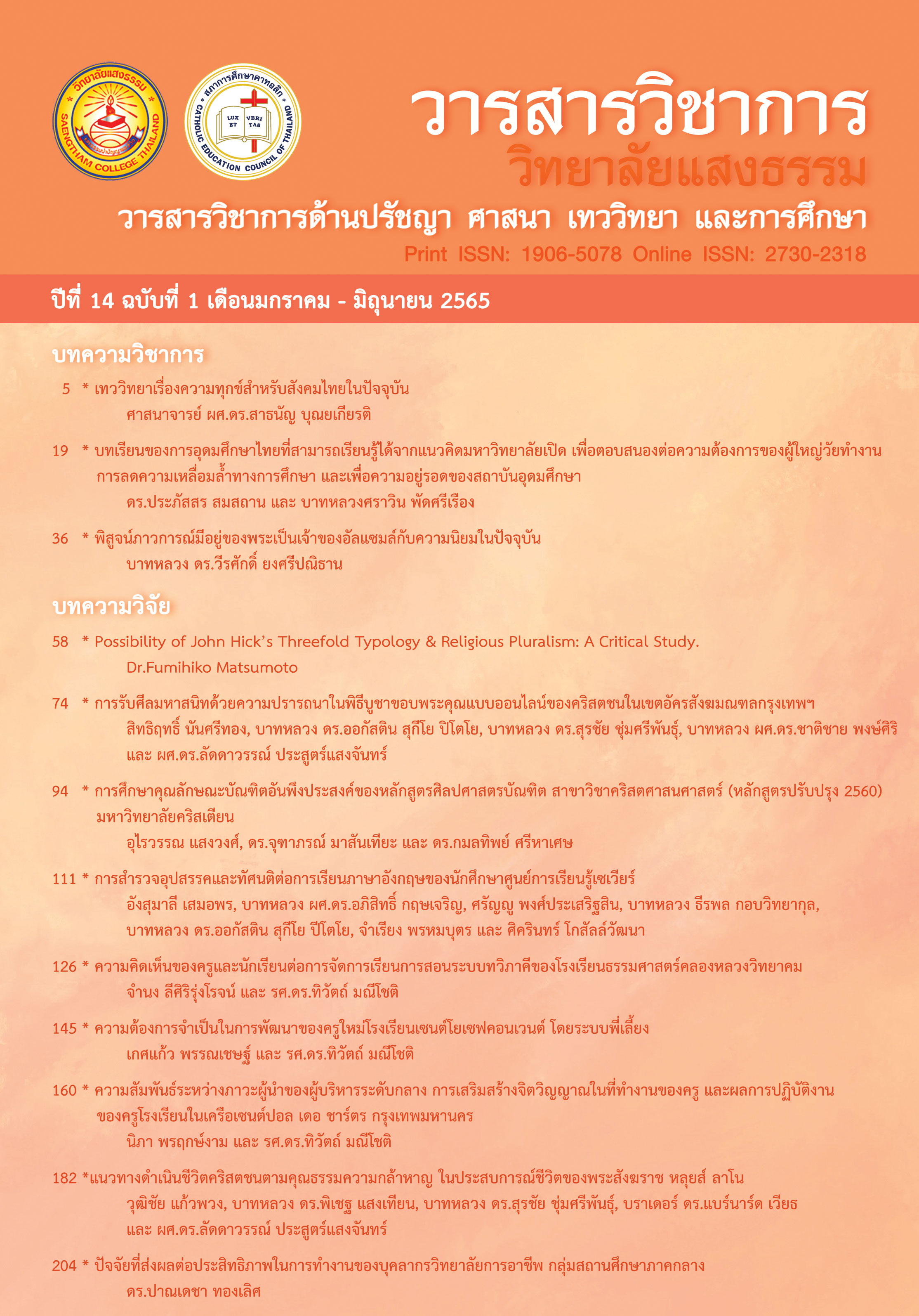The Needs for New Teacher of Saint Joseph Convent School Development by Using Mentoring System.
Main Article Content
Abstract
The purpose of this research was to study the needs assessment of the mentoring program in order to help new teachers. The mentoring assessment can be separated into five parts: mentoring performance, being an example, giving teaching advice, teaching observation, and giving personal advice. The population consists of all 30 new teachers who started teaching during 2560-2562. The research instruments used for this study were questionnaires, the reliability was .988, the current situation was .979, and the desirable situation was 0.988. In addition descriptive statistics such as frequency distribution, Mean, Standard Deviation, Modified Priority Needs Index (PNIModified) were employed to analyze the data in the research. 1. Overall current situation in developing the new teacher were at the highest level. When examining each item, being an example and teaching observation was the highest. Followed by giving teaching advice and giving personal advice. Mentoring performance was the lowest average. 2. Desirable situation overall was at the highest level. When examining each item, giving teaching advice, and teaching observation, each was the highest average. Followed by mentoring performance and being an example. Giving personal advice was the lowest average. 3. The needs assessment when examining each item, teaching advice was the highest with PNIModified. The second was mentoring, teaching observation, and giving personal advice. The lowest was being an example.
Article Details

This work is licensed under a Creative Commons Attribution-NonCommercial-NoDerivatives 4.0 International License.
- The academic and research articles, as well as the content and opinions expressed therein, published in Saengtham College Journal are solely the responsibility of the respective author(s).
- Articles published in Saengtham College Journal are the property of Saengtham College. Reproduction, modification, or dissemination of all or part of the content in any form without written permission from Saengtham College is prohibited.
- Articles published in Saengtham College Journal are protected under the Copyright Act.
References
ณัฏฐพันธ์ เขจรนันทน์. (2551). พฤติกรรมองค์การ. บริษัท วี พริ้นท์.
ทัศนีย์ ศรีจันทร์. (2557). การศึกษาแนวทางในการพัฒนาบุคลากรสายสนับสนุนด้านระบบพี่เลี้ยงในมหาวิทยาลัยทักษิณ [วิทยานิพนธ์ปริญญามหาบัณฑิต]. มหาวิทยาลัยมหิดล.
พรสุดา ฮวบอินทร์. (2559). ผลการพัฒนาครูตามโครงการพัฒนาครูด้วยการสร้างระบบพี่เลี้ยง Coaching and mentoring ที่มีต่อประสิทธิผลของสถานศึกษาตามการรับรู้ของครู: กรณีศึกษาสถานศึกษามัธยมศึกษา จังหวัดปทุมธานี [ปริญญามหาบัณฑิต]. มหาวิทยาลัยเทคโนโลยีราชมงคลธัญบุรี.
โรงเรียนเซนต์โยเซฟคอนเวนต์. (2562). คู่มือครูโรงเรียนเซนต์โยเซฟคอนเวนต์. เอกสารอัดสำเนา.
โรงเรียนเซนต์โยเซฟคอนเวนต์. (2562). ใบแสดงลักษณะงาน. เอกสารอัดสำเนา.
โรงเรียนเซนต์โยเซพคอนเวนต์. (2562). แผนพัฒนาการจัดการศึกษา ปี 2562-2564. เอกสารอัดสำเนา
วชิรา เครือคำอ้าย และ ชวลิต ขอดศิริ. (2561). การพัฒนารูปแบบการนิเทศโดยใช้กระบวนการชี้แนะและระบบพี่เลี้ยง เพื่อส่งเสริมศักยภาพการจัดการเรียนรู้ในศตวรรษที่ 21 สังกัดสำงานคณะกรรมการการศึกษาขั้นพื้นฐาน จังหวัดเชียงใหม่. สืบค้นจาก http://www.ar.or.th/ImageData/Magazine/20052/DL_10470.pdf?t=637068573406086507
วิจารณ์ พาณิช. (2556). วิถีการเรียนรู้เพื่อศิษย์ในศตวรรษที่ 21. http://www.noppawan.sskru.ac.th/data/learn_c21.pdf
อัญชุลี อุดรกิจ และ พงษ์ธร สิงห์พันธ์. (2559). สภาพและปัญหาในการปฏิบัติงานของครูผู้ช่วยในโรงเรียนมัธยมศึกษาสังกัดสำนักงานเขตพื้นที่การศึกษามัธยมศึกษา เขต 28. https://www.tci-thaijo.org/index.php/buajead-ubru/article/view/64187/52660.
Bryk, A.S., Lee, V. E., & Holland, P. B. (1993). Catholic schools and the common good. Cambridge. Harvard University Press.
Earley, P., Weindling, D., Bubb, S. & Glenn, M. (2009). Future leaders: The way forward?. In School Leadership & Management, 29(3), 295-306.
Gaskill, L. R. (1993). A conceptual framework for the development, implementation and evaluation of formal mentoring programs. Journal of Career Development, 20(2), 147-160.
Glickman, C. D. (2004). Supervision and Instructional Leadership: A Develop mental Approach. Allyn & Bacon.
Good, Carter V. (1973). The theory and practice of supervision. Prentice-Hall.
Gopee, N. (2008). Mentoring and Supervision in Healthcare. Sage.
Grace, G. (1995). School Leadership: Beyond Educational Management. Falmer Press.
Harris, B. M. (1985). Supervision in Education. University of Texas Press.
Ingersoll, R. & Smith, T. (2003). The wrong solution to the teacher shortage. Educational Leadership, 60(8), 30-33.
Kurtts, S. A., & Levin, B. B. (2000). Using peer coaching with preservice teachers to develop reflective practice and collegial support. Journal Teaching Education, 11(3), 297-310.
Plamondon, K. & CCGHR Capacity Building Task Group. (2007). Capacity Building Task Group. http://www.inclentrust.org/uploadedbyfck/file/compile%20 resourse/new-resourse-dr_-vishal/Mentoring_Module2_e.pdf
Riggs, I. M., & Sandlin, R.A. (2000). Teaching portfolios for support of teacher’s professional growth. NASSP Bulletin, 84(618), 22-27.
Simkins, T., Close, P. & Smith, R. (2009). Work-shadowing as a process for facilitating leadership succession in primary schools. School Leadership & Management: Formerly School Organization, 29(3), 239-251.


